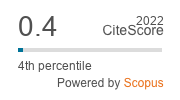Efficacy and biosafety of new generation insecticides for the management of Leucinodes orbonalis Guenee (Lepidoptera: Pyralidae) in brinjal and Earias vitella Fabricius (Lepidoptera: Noctuidae) in okra
DOI:
https://doi.org/10.33307/entomon.v44i3.462Abstract
The field trials were conducted at the College of Agriculture, Vellayani to determine the efficacy of eight new generation insecticides viz., emamectin benzoate 5SG @10 g a.i. ha-1, spinosad 45 SC @ 75 g a.i. ha-1, novaluron 10 EC @ 100 g a.i.ha-1, chlorantraniliprole 18.5 SC @ 30 g a.i. ha-1, indoxacarb 14.5 SC @ 60 g a.i. ha-1, fipronil 80 WG @ 50 g a.i. ha-1, thiodicarb 75 WP@ 750 g a.i. ha-1 and flubendiamide 480 SC@ 100 g a.i. ha-1 against fruit borers of brinjal and okra. Two conventional insecticides (carbaryl 50 WP @ 750 g a.i. ha-1 and malathion 50 EC @ 500 g a.i. ha-1) and an untreated control were maintained as check. Damages to brinjal and okra fruits were reduced by 45.96 to 72.21 per cent and 44.34 to 83.26 per cent, espectively by these new generation insecticides. Chlorantraniliprole, indoxacarb, emamectin benzoate and flubendiamide recorded more than 60 per cent reduction in fruit damage in brinjal, and chlorantraniliprole, flubendiamide and indoxacarb with more than 70 per cent reduction in fruit damage in okra were superior. The yield was also significantly high in these treatments in the two crops. All the insecticides were compatible with Beauveria bassiana (Blas.) Vuill, and Metarhizhium anisopliae (Metsch). Flubendiamide and carbaryl inhibited the growth of Lecanicillium (Verticillium) lecanii Humber.


